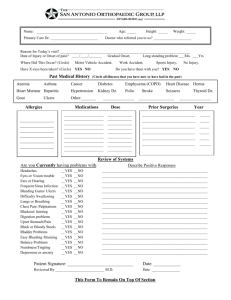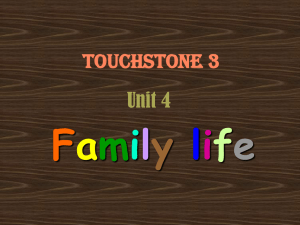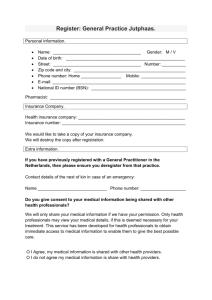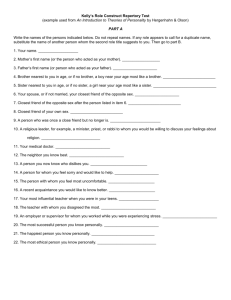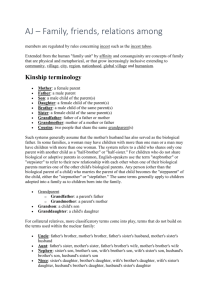Describing Your Family - Profesionālajā izglītībā iesaistīto
advertisement
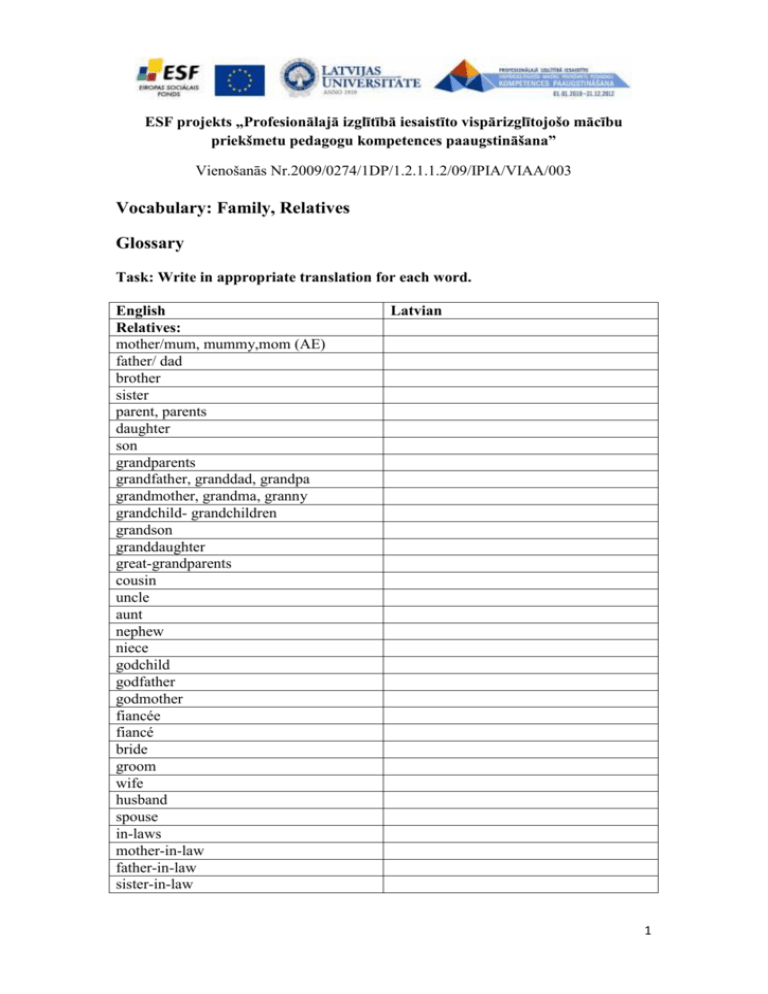
ESF projekts „Profesionālajā izglītībā iesaistīto vispārizglītojošo mācību priekšmetu pedagogu kompetences paaugstināšana” Vienošanās Nr.2009/0274/1DP/1.2.1.1.2/09/IPIA/VIAA/003 Vocabulary: Family, Relatives Glossary Task: Write in appropriate translation for each word. English Relatives: mother/mum, mummy,mom (AE) father/ dad brother sister parent, parents daughter son grandparents grandfather, granddad, grandpa grandmother, grandma, granny grandchild- grandchildren grandson granddaughter great-grandparents cousin uncle aunt nephew niece godchild godfather godmother fiancée fiancé bride groom wife husband spouse in-laws mother-in-law father-in-law sister-in-law Latvian 1 brother-in-law friend boyfriend girlfriend twins triplets siblings General: to adopt to raise to bring up to fall in love to be engaged to be married baby child kid ancestor generation adult youth teenager relative engagement wedding to be divorced to live together widow widower couple spinster bachelor my younger sister my elder sister foster child orphan guardian 2 Conversation Practice Task: Tell your classmates or teacher about your family. (If you have a family photograph, you may wish to show it to them.) There are five people in my family. (My mom, dad, older brother, younger sister and me.) OR My mother is a dentist. My father is a veterinarian. I have two brothers and one sister. OR (while showing a picture) This is my grandma... This is my dad... This is me, when I was 9 years old. 2. Ask your classmates about their families. How many brothers and sisters do you have, Tammy? I have one sister. What's her name? Mary. How old is she? She's seventeen. Phrases and questions with answers Introducing your family This is my mother/mom. This is my father/dad. These are my parents. This is my wife. This is my husband. There are five people in my family. I have two brothers. One is older. One brother is older (than me). One is younger. I have one sister. 3 Asking about family How many brothers and sisters do you have? I have two brothers and two sisters. I do not (don’t) have any brothers or sisters. I am the only child. How many children do you have? We have two: one son and one daughter. Do you have any kids? No, I'm not married. 4 Activity: Creating a Family Album The aim and objectives: The activity will allow students to explore the family or household unit, of which they are an essential member. They will create a Family Album using all of the family pictures brought in by the students. The activity will allow the students to see the number of people that are represented in the community. The students will describe the family members; identify differences in families that are represented in the class. Materials: Family or household pictures or drawings from home that show every member of the household; Paper, glue, stapler; Procedure: Each student should bring a photograph or drawing of each family member to be added to the "Family Album"; Students discuss when this picture was taken and how old he/she was when the picture was taken; Students rank the members from oldest to youngest; Students discuss what each member in the household contributes and how important every member is to the family; Students write a short description of each family member and add the picture on a separate sheet of paper; the pages are stapled together to form a book; the books are displayed in the classroom; other students ask questions about other families; students compare their families, finding similarities and differences. 5 Describing Your Family Read the following description of a family. Jack is married to Alice. She is his wife and he is her husband. They have a daughter and a son. The son's name is Henry and the daughter's name is Lisa. They live next to Alice's parents, Harry and Marjorie. Harry is Alice's father and Marjorie is her mother. Harry is Jack's father-in-law and Marjorie is his mother-in-law. Henry is Harry's grandson and Lisa is Marjorie's granddaughter. Alice has a sister and a brother. Her sister's name is Mary and her brother's name is Frank. Frank has two children, David and Sherrie. Sherrie is Alice's niece and David is Alice's nephew. Alice is their aunt and Jack is their uncle. Complete the following chart of family relationships using the opposite family members. The first has been done for you. husband wife son mother-in-law aunt nephew grandfather granddaughter father sister Description of my family There are five people in my family: me, my sister, my brother and my parents. 6 My mother is 46 years old. Her name's Anna. She has short, blond hair and beautiful green eyes. She's rather slim because she follows a sensible diet and does regular exercises. She's very good-looking, always well-dressed and elegant. She's very warm-hearted, but when I do something wrong, she can be strict. She likes reading books very much. My father, Peter, is 7 years older than my mother. He's 53. He has bright blue eyes. He's quite tall. He's very hard-working. He is working in a man's fashion company, and he is doing also housework. He even makes dinner for us when mother is outside. He likes cooking, and his meals are always very tasty. Next is my parents' oldest son. My brother’s name is Tom. He's 25 and he's 5 years older than me. He's tall and rather slim. He's always well-dressed because he likes to buy nice and fashionable clothes. Sometimes I'm stealing his shirt or jeans and then he's going mad. He's easy-going but very sharp and brainy. He was studying the German language and now he's working in his own catering company. Finally, my sister Mary. She's 22. She's got long wavy hair and freckles. She's definitely shorter than me and my brother. She's rather introvert. I think she's very sensitive. But she's very sensible, smart and co-operative. She's learning a lot and always can help. She's studying English and also knows German and French. I want to be as smart as she is. They all, except me, speak German very well, because we were living in Germany for 4 years. Our family hobby is skiing in winter and travelling in summer. Material for Intermediate level students Family Vocabulary 7 Your family members are also called your relatives. You have an immediate or nuclear family and an extended family. Your immediate family includes your father, mother and siblings. Your extended family includes all of the people in your father and mother's families. Your sibling is your brother or sister. If you have 1 brother and 2 sisters, then you have 3 siblings. Your parent is your father or mother. Your child is your son or daughter. Your spouse is your husband or wife. You may also have a stepfamily. Your stepfamily includes people who became part of your family due to changes in family life. These changes may include death, divorce or separation. New partnerships create new children. The new children and their relatives become part of your blended family. Some people are born into a stepfamily. My relatives female Relationship to Me mother relative of whom I am the child brother sister we have the same father and mother uncle aunt male parent father sibling grandparent grandfather grandmother Translation (Latvian) sibling of my parent parent of my parent child of my uncle or aunt cousin wife relative to whom I am married son daughter relative of whom I am the parent nephew niece spouse husband child grandchild child of my sibling child of my 8 child grandson granddaughter great grandfather great grandmother parent of my grandparent father-in-law mother in-law parent of my spouse brother-in-law sister in-law sibling of my spouse; spouse of my sibling ex-husband ex-wife my previous spouse (we divorced) half-sister my sibling born to my father or mother but not both half-brother step-parent step-father step-mother step-child step-son step-daughter new spouse of one of my parents child of my spouse but not of me In a family, the word generation means all the people in one stage of the family. For example, your parents are one generation, you and your siblings are the next generation, and your children and their cousins are another generation. (explanations taken from Longman Dictionary of Contemporary English: the Living Dictionary (2003)) English Vocabulary for talking about your family Your family tree 9 Your closest relatives are your parents: your mother and father; and your siblings (brothers or sisters). If your mother or father is not an only child, you also have aunts and / or uncles. An aunt is the sister of your mother or father, while an uncle is the brother of your mother or father. Your female child is called your daughter, and your male child is your son. If your aunts or uncles have children, they are your first cousins. (In English, the word cousin is used, whether the cousin is female or male.) Your female cousin is your mother (or father's) niece, while a male cousin is the nephew of your mother and father. In-laws When you marry, your husband (or wife's) family become your in-laws. The mother of your spouse (husband or wife) is your mother-in-law and his or her father becomes your father-in-law. The term in-law is also used to describe your relationship with the spouses of your siblings. So the husband of your sister becomes your brother-in-law, while the sister of your husband becomes your sister-in-law. If you are a woman, you become the daughter-in-law of your husband's parents, and if you are a man, you become the son-in-law of your wife's parents. The same term inlaw is used for all generations. The husband of your aunt is still your mother's brotherin-law. Grandparents / grandchildren The parents of your parents are your grandparents – grandmother and grandfather. You are their grandchildren – either a granddaughter or a grandson. If your grandparent has a sister, she is your great-aunt. If your grandparent has a brother, he is your great-uncle. (And you are either his or her great-niece or great-nephew.) The mother of your grandmother or grandfather is your great-grandmother. The father is your great-grandfather. If you go back another generation, the grandmother of your grandmother / grandfather is your great-great-grandmother. The grandfather of your grandparent becomes your great-great-grandfather. Second families 10 If your mother or father remarries, you can acquire a new family and set of relatives. For example, if your father marries a second wife, she becomes your step-mother. Any children she already has become your step-sisters or step-brothers. If your mother or father remarries and has children, they become your half-brothers or half-sisters. You might also hear people talking about their biological brother / sister etc, to mean a brother who is related by blood, rather than by marriage. Types of family nuclear family = mother, father and children: "The traditional British family unit is a nuclear family." single-parent / one-parent family = a family which only has one parent (because the parents are divorced, or because one of the parents has died): "There are more and more single-parent families in the UK." immediate family = your closest relatives: "Only immediate family members attended the funeral." extended family = your entire family: "The wedding invitations were sent to the entire extended family." close-knit family = a family where the members have close relationships with each other: "They are a close-knit family." dysfunctional family = a family where the members have serious problems with each other: "He comes from a rather dysfunctional family." blood relative = a relative connected to you by "blood" rather than through marriage: "She's not a blood relative, but we're still very close." Expressions with family family gathering = a meeting / celebration of family members: "There's a small family gathering next week." family resemblance = where members of the family look / act similar: "You can see a distinct family resemblance between the father and the son." to start a family = to start having children: "They want to wait a couple of years before starting a family." to run in the family = a characteristic that is common among family members: "Baldness runs in his family." 11 to bring up / raise a family = to have and look after children: "It's difficult to raise a family on one income." a family car = a car big enough to transport a family: "The Volvo Estate is a popular family car." family-size = large quantity item: "We need to buy family-size packets of biscuits!" family-friendly = a policy that favours families: "This hotel is family-friendly." family doctor = a doctor who looks after general medical needs: "There are a number of good family doctors in this area." family man = a man who prefers to spend his time with his family: "John is a family man." family values = traditional ideas about what a family should be: "Some political parties often emphasise family values and the importance of marriage." family name = surname: "What's your family name?" 12


